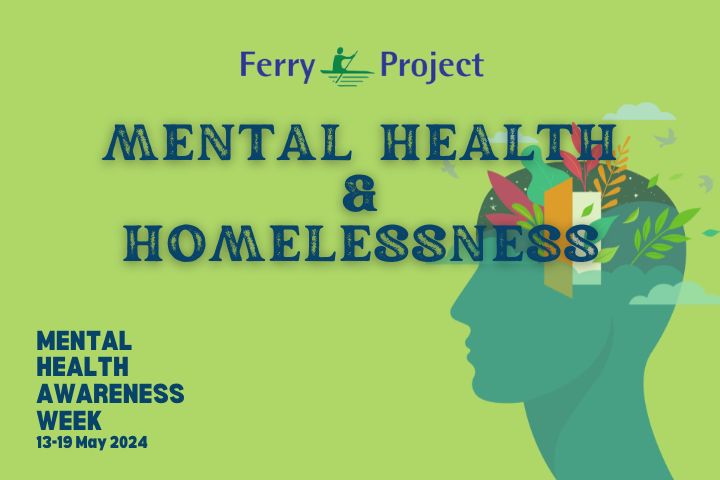➤
Back to News
13 May 2024
Mental Health and Homelessness
Mental Health Awareness Week
This year, Mental Health Awareness Week is running from the 13-17th of May with the theme of “No Mind Left Behind”. With a quarter of people in the UK experiencing mental health issues each year, it’s vital that those who need it are able to access help and support. For those who are homeless, however, this is often not the case. Despite the incredibly high rates of mental health issues among homeless people, they generally face many more barriers to accessing support than the rest of the population.
So why is this the case, and what does Ferry Project do to help?
For the majority of homeless people, becoming homeless was not simply about losing a permanent place to live. For some, it was going through a messy divorce, or escaping an abusive household, losing both their family and their home along the way. For others, it was having no one to call when they needed a sofa to sleep on for the night, because their friends didn’t stick by them when the going got tough. These challenges, on top of the stress and uncertainty of not having a place to sleep each night, are part of the reason why so many people facing homelessness will also have a mental health issue.
A report produced by HomelessLink, which collated data from 31 Homeless Health Needs Audits between 2018 and 2021 (representing in total almost 3000 homeless individuals) identified that 82% of those surveyed had a diagnosed mental health issue. Research done by homeless charity Crisis suggested a similar figure (8 in 10 rough sleepers).
But despite these stark figures, few homeless people are able to access the help and support they need. In a time where NHS waiting lists are long to begin with, barriers such as a lack of ID or a permanent address make even starting on the process of accessing help incredibly difficult and are a key reason why so many homeless people struggling with a health issue go to A&E departments instead.
In fact, data from the HomelessLink survey identified that 38% of respondents had been admitted to hospital in the last 12 months, and that 28% of these admissions were for mental health issues. However, a quarter of those admitted were discharged back to the street. This shows the difficulty for homeless people in accessing real long term mental health support, as even in extreme cases of hospital admission, many are released without a safe place to go home to.
With this lack of proper care, lots of people are forced to find their own coping strategies. Oftentimes these are unhealthy and can even make their current situations worse. Almost half (45%) of all respondents to the HomelessLink survey said they used alcohol or drugs to self-medicate and cope with their mental health. Ferry Project’s own data from 2022-23 tells a similar story. Of the people who stayed in our emergency accommodation during that time, 90% needed support for alcohol issues, and 60% had a history of self-harm.
These unhealthy and self-destructive coping strategies are an indicator of the desperation of people’s situations. Instead of having a comforting shoulder to cry on, or a safe, warm bed to curl up in at night, homeless people may turn to drink or drugs to numb their pain instead. They are trying their best to cope, but often they have no one who they can rely on or trust to help.
It’s no wonder, then, why research by Crisis indicated that homeless people are nearly ten times more likely to take their own lives than the general population. Without anyone to turn to when life is at its worst, people can feel hopeless and isolated.
What does Ferry Project do to help?
First of all, we keep our doors open 24 hours a day, 365 days a year. We offer support to anyone who needs it, whether it be helping someone to avoid becoming homeless to begin with or helping them to get back into housing. Or even just offering a warm, safe bed for the night.
We sit down with everyone who comes into our emergency accommodation to assess what help we might be able to offer them, as well as working out next steps that are right for them. This could mean practical help with admin or forms; for example, we made sure 100% of clients who stayed in our emergency accommodation (between March 2022 and April 2023) were registered with a GP by the time they left. It could also mean referring clients to the right services within the NHS (e.g. specific for alcohol issues).
For other clients, it’s being able to reach out and be a person they can trust. We had a client named Marek who wasn’t able to speak good English, so although he had been struggling with anxiety and depression, he hadn’t been able to explain to anyone what was wrong. However, one of our support staff was able to speak to him in his first language, Polish, which meant he could finally talk to someone about the challenges he had been facing.
For a lot of our clients who have spent a long time feeling alone and isolated, this type of support is incredibly important. Although it may take time, our staff are able to build relationships with even the most vulnerable clients who struggle to trust people or feel like they can open up to anyone. For one client, Jess, this building of trust was central to us being able to help her. She had experienced abuse from a young age, and hence was incredibly reluctant to trust anyone at all. But over time, our staff were able to reach out to her and work with her until she felt comfortable enough to move into our hostel. For clients like Jess, knowing that someone cares and is looking out for them is the most important thing. They are no longer alone.
In fact, a third of our clients staying in Clarkson House hostel reported that they were feeling more confident and less isolated. A third also said they had been able to reach out and improve contact with their families again. Helping our clients to rebuild confidence, self-esteem, and a strong support network is the most important part of what we do at Ferry Project.
What can you do?
This Mental Health Awareness Week, take some time to think about the people you walk past on the street. Think about what they might be facing, and what life might look like for them. Show compassion where you can, whether it’s just in a smile, or whether it’s asking if you can buy them a tea or a coffee. Or you can donate to us or other homelessness charities and help us to continue to provide the support homeless people desperately need.
But whatever it is you do, remember the theme for this year: No Mind Left Behind. It’s true that we’ve started to break the stigma around mental health now, and we’re starting to talk about it a lot more as a society. So, let’s lend our voices and start talking about those who aren’t so able to speak up for themselves.






